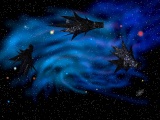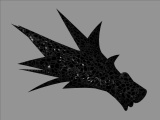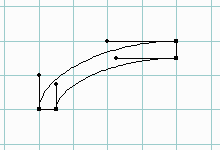 |

Version 2
Using videotapes of Shadow fighters I've reverse- engineered their
3D structure and
used Raydream 3D studio to make a 3D model. The battle between the Shadow
figher squadron attempting to place the bomb on Babylon 4 and the
White Star in
War Without End, Part 1 was especially helpful. When I revised the model to
create version 2, the scene in
Shadow Dancing
in which a damaged Shadow fighter tumbles after being hit by fire from one of
the Vree saucer ships gave me a much better look at the back of the fighter.
 If you're unfamiliar with the show, see sections entitled
"Shadows" in the
second season and
third season background summaries on the
Lurkers Guide to
Babylon 5 for more information.
If you're unfamiliar with the show, see sections entitled
"Shadows" in the
second season and
third season background summaries on the
Lurkers Guide to
Babylon 5 for more information. |

Images



 |
Shadow Fighters on blue nebula
(60 KB JPEG)

The 3D model was rendered using a background
in which the stars and clusters were created using the
Universe program and combined with a nebula painted with
Corel Photopaint 6.
 |


 |
Single Shadow Fighter (42 KB
JPEG)

A larger rendering of a single Shadow fighter on a grey
background.
 |


 |
Color-Coded Shadow Fighter (33 KB
JPEG)

The same 3D model of the shadow fighter in the same orientation as the
above image was rendered with different sections
of the fighter in a different primary colors. You can see the
structure of the ship more clearly.
 |

3D Model Details

This model was actually significantly harder to do than my initial
attempt modeling the Battlecrab. The
biggest problem was creating the collar of spikes (yellow in the
color-coded image above) so that they would smoothly join with the
foward (red) section. When I made the model, Ray Dream Designer did not
include Boolean operators (version 4.1 does), so that the option of making a single, larger shape and
then cutting pieces out of it (which I think would have been simpler)
was not available.
 Instead, I had to more or less join the objects up manually.
The back of the front section is an ellipse.
Instead, I had to more or less join the objects up manually.
The back of the front section is an ellipse.

By playing around with the
Bézier drawing tool, I found that a quadrant of an ellipse could
be created by pulling the handles on the corner points out to one-half
the size of the ellipse quadrant (see figure). The other handles (corresponding to
the short, straight segments joining the inner and outer point) were
fully retracted. This cross section was extruded with a symmetric envelope.
The extrusion path was adjusted to make the spikes 'point out'.
 The final step to insure smooth joining was to extend a set of
Bézier handles from the start point of the extrusion path. I
used the handle to make the initial direction of the extrusion path
match the slope of the cone that I was joining to. For example, the
slope of the front section cone when viewed from above is 3:1. When
I created the spikes, I draged the handle for the extrusion path
(as viewed from above) to match the 3:1 slope. Since the slope when
viewed from the side is different (6:1), I had to drag the handle to
a different slope when viewed from the side.
The final step to insure smooth joining was to extend a set of
Bézier handles from the start point of the extrusion path. I
used the handle to make the initial direction of the extrusion path
match the slope of the cone that I was joining to. For example, the
slope of the front section cone when viewed from above is 3:1. When
I created the spikes, I draged the handle for the extrusion path
(as viewed from above) to match the 3:1 slope. Since the slope when
viewed from the side is different (6:1), I had to drag the handle to
a different slope when viewed from the side.
 After I figured that out, the major remaining challenge was to
create the weapon mount at the front of the fighter. I experimented with
various single and combination objects, but finally modelled the
entire front section as a single object. It has three different cross
sections: #1 and #3 are ellipses, and #2 is the complex shape (created
with the Bézier drawing tool) that gives the bumps above and below.
The object was extruded using the pipeline setting with a free envelope.
After I figured that out, the major remaining challenge was to
create the weapon mount at the front of the fighter. I experimented with
various single and combination objects, but finally modelled the
entire front section as a single object. It has three different cross
sections: #1 and #3 are ellipses, and #2 is the complex shape (created
with the Bézier drawing tool) that gives the bumps above and below.
The object was extruded using the pipeline setting with a free envelope.
 Finally, the skin of the object was created using a cellular
mixing function newly available in Ray Dream Studio 4.1.
Finally, the skin of the object was created using a cellular
mixing function newly available in Ray Dream Studio 4.1.
 I'm interested in feedback on the model. Let me know how close you think
it is to the real thing on the show, and what modifications you
would suggest to get it closer.
I'm interested in feedback on the model. Let me know how close you think
it is to the real thing on the show, and what modifications you
would suggest to get it closer. |

3D Model Files


Feel free to create your own renderings or modify the models.
Please include a link back to this page if you put any of the
results up on the WWW.
 You can E-mail me if
you would like me to add you to a list of people I notify when
I put up new or revised models on this site.
You can E-mail me if
you would like me to add you to a list of people I notify when
I put up new or revised models on this site. |


Changes in the Shadow Fighter model
The change in the model shape was all in the back. Two large spines extending straight back
were replaced by one large central spine extending straight back and two thinner spines on either side which are angled out and down. A side-by-side comparison with the new version in the foreground (36 KB JPEG) shows the change clearly.
 The other change was to the surface shader. The 4.1 version of Ray Dream Studio introduced a set of new 'cellular' mixing functions that are ideal for modeling organic textures. The surface of the Shadow fighter was redone using the new shader. The other change was to the surface shader. The 4.1 version of Ray Dream Studio introduced a set of new 'cellular' mixing functions that are ideal for modeling organic textures. The surface of the Shadow fighter was redone using the new shader.

|
|

